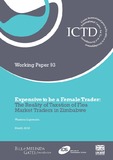| dc.contributor.author | Ligomeka, Waziona | |
| dc.coverage.spatial | Zimbabwe | en |
| dc.date.accessioned | 2019-03-21T09:51:47Z | |
| dc.date.available | 2019-03-21T09:51:47Z | |
| dc.date.issued | 2019-03-20 | |
| dc.identifier.citation | Ligomeka, W. (2019) Expensive to be a Female Trader: The Reality of Taxation of Flea Market Traders in Zimbabwe, ICTD Working Paper 93, Brighton, IDS | en |
| dc.identifier.isbn | 978-1-78118-533-9 | |
| dc.identifier.uri | https://opendocs.ids.ac.uk/opendocs/handle/20.500.12413/14419 | |
| dc.description.abstract | The proportion of economic activities that are categorised as informal or small-scale is unusually high in Zimbabwe. Given the depressed state of the economy over an extended period, it is logical that the government is more actively taxing small-scale business activities.
Specifically, in 2005 the government introduced a presumptive tax (a tax on gross income), to be paid by small-scale traders in some businesses. The presumptive tax was broadened to include more small-scale businesses in 2011. While increasingly more of the small-scale sector is being subjected to the presumptive tax, little is known about the impact of this tax on the traders themselves – particularly its impact on women, who make up the majority of small-scale traders in Zimbabwe.
This study aims to unravel the reality of taxation in Zimbabwe’s small-scale sector by focusing on flea market traders. The research involved interviewing small-scale traders in flea markets around Harare and Bulawayo, government officials and members of a smallscale traders association, and focus group discussions with flea market traders. This paper analyses the different types of tax payments that flea market traders make, the proportion of their income paid in taxes, and gender disparity in flea market trader taxation. Using a representative taxpayer approach, it finds that flea market traders pay a higher proportion of
their income in taxes than formal traders, and therefore taxes paid by flea market traders are highly regressive. Women who operate in flea markets are more adversely affected by taxes because they earn a lot less than men (and are thus affected by the regressive nature of informal taxes), and because the markets in question have more women than men. The paper considers the implications of these findings on tax policy as it pertains to small-scale traders in general, and specifically to flea market traders. | en |
| dc.language.iso | en | en |
| dc.publisher | IDS | en |
| dc.relation.ispartofseries | ICTD Working Paper;93 | |
| dc.rights.uri | http://creativecommons.org/licenses/by-nc/4.0/ | en |
| dc.subject | Finance | en |
| dc.subject | Gender | en |
| dc.subject | Governance | en |
| dc.title | Expensive to be a Female Trader: The Reality of Taxation of Flea Market Traders in Zimbabwe | en |
| dc.type | Series paper (non-IDS) | en |
| dc.rights.holder | Institute of Development Studies 2019 | en |
| dc.identifier.team | Governance | en |
| rioxxterms.version | VoR | en |


